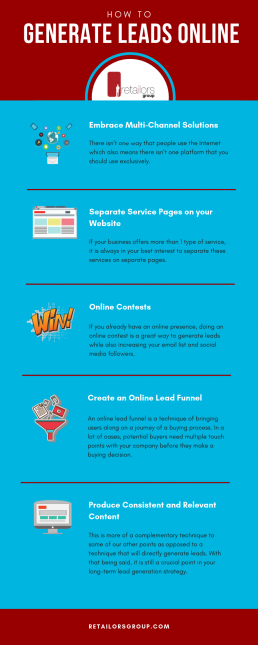One of the more challenging aspects of running a service-based company is generating leads. There are a lot of techniques that have been used for decades that companies have tried including cold calling, print distribution, trade shows, etc. Although these techniques might still work, using online platforms has become a popular choice for companies to use to generate leads in more recent years.
Below are some of the strategies that will help you generate more leads online:
1. Embrace Multi-Channel Solutions
There isn’t one way that people use the Internet which also means there isn’t one platform that you should use exclusively.
Some people find companies by searching for their services and others get drawn in by an ad they see on Facebook. Even drilling deeper, some people click on Google paid ads as they are the first thing they see on search results, while others ignore ads and scroll to organic search results.
To master online leads, you need to do a lot of tests and you need to utilize multiple channels to be effective. Some of the channels we have found to work to generate online leads include:
- Google (paid ads and organic)
- Social Media (Facebook, Instagram, LinkedIn for B2B, Twitter)
- Email Campaigns
- Online Directories (Homestars, Better Business Bureau, Yelp)
2. Separate Service Pages on your Website
If your business offers more than 1 type of service, it is always in your best interest to separate these services on their own pages.
Doing this gives you a better chance to rank your service organically on search engines. When you have multiple services on one page, it makes it very difficult for search engines like Google to figure out which keyword or phrase on the page you were intending to rank.
Moreover, your competitors likely have their services broken out on separate pages, giving them more relevance on specific services, thus allowing them to rank higher than you as Google will clearly understand what they are intending to rank for.
3. Online Contests
If you already have an online presence, doing an online contest is a great way to generate leads while also increasing your email list and social media followers.
In order to run an effective online contest, you need to develop a strategy on who your target audience is and what you want to accomplish by running this contest. If done properly, you can instantly tap into warm leads for your service, but also have an audience that you can directly advertise to in the future.
4. Create an Online Lead Funnel
An online lead funnel is a technique of bringing users along on a journey of a buying process. In a lot of cases, potential buyers need multiple touchpoints with your company before they make a buying decision. We wrote an article before on the buyer purchase decision process online which dives into detail on this subject.
The crucial mistake a lot of companies make when advertising online is they try to capture buyers at the end of the cycle and completely ignore the other steps involved in the funnel.
Devising a proper lead generation funnel for your online strategy will not only generate you leads but it will also save you money in the future as your targeting will now be more precise as you will be advertising to individuals that have already shown interest in your company.
5. Produce Consistent and Relevant Content
This is more of a complementary technique to some of our other points as opposed to a technique that will directly generate leads. With that being said, it is still a crucial point in your long-term lead generation strategy.
In point number 4 we discussed creating a funnel to generate leads. The first stage in most lead generation funnels is bringing people into the funnel through addressing a need or answering a question. This is where having blogs, infographics and videos can help. As soon as a user engages with your content, you are now given the opportunity to either retarget or identify similar users that you can advertise to.
Having consistent and relevant content is also a crucial part of SEO, which will help boost your rankings, which will then help boost your leads.
Moreover, when potential buyers do research on your company, it is always a confidence booster to see that you know what you’re talking about through your content.
Need Help Generating Leads?
Retailors Group is a full sales and marketing agency. We utilize various digital marketing techniques like SEO and paid advertising to generate online leads.

